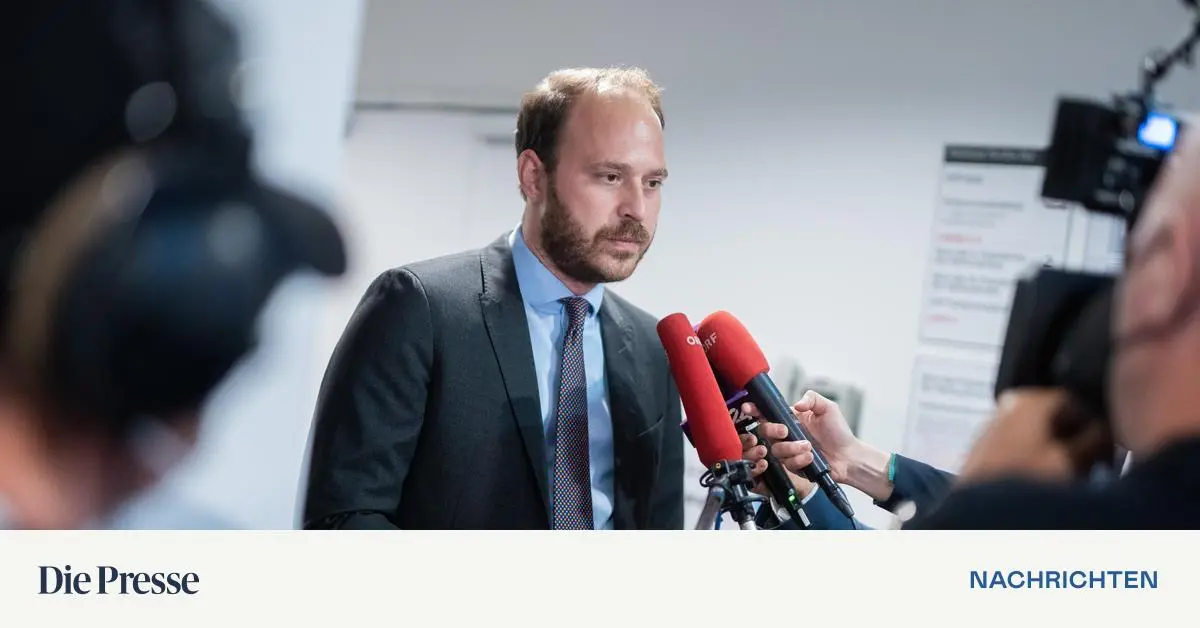Coalition tension Brews in Austria Over Proposed Cell Phone Surveillance
Table of Contents
- 1. Coalition tension Brews in Austria Over Proposed Cell Phone Surveillance
- 2. The Push for Enhanced Surveillance
- 3. Echoes of the Debate in the United States
- 4. NEOS’s Displeasure and Coalition Challenges
- 5. Expert Perspectives
- 6. Potential Implications for U.S. Policy
- 7. Addressing Counterarguments
- 8. Conclusion
- 9. What are the potential consequences of a government eroding public trust in its digital security measures, according to Dr. sharma?
- 10. Interview: Navigating the Encryption Debate: A Conversation with Dr. Anya Sharma
- 11. The Austrian proposal: A Closer Look
- 12. Balancing Security and Privacy
- 13. The International Outlook
- 14. Addressing Counterarguments
- 15. Thought-Provoking Question
Plans to expand government surveillance of encrypted messaging apps sparks debate and highlights divisions within the ruling coalition.
By Archyde News
Vienna, Austria – Just a month into their coalition, the “turquoise-red-pink” government in austria faces a significant challenge: a controversial proposal to expand surveillance capabilities to include encrypted messaging apps. This plan, spearheaded by the ÖVP (austrian People’s Party), is already causing friction with NEOS (The New Austria and Liberal Forum) and places considerable pressure on the fragile coalition.
While the coalition partners initially presented a united front, this measure exposes underlying tensions. The disagreement centers around the balance between national security and individual privacy, a debate familiar to Americans navigating similar challenges in the digital age.
The Push for Enhanced Surveillance
During the Vienna election campaign, the ÖVP pledged to equip investigative authorities with enhanced technological tools to monitor potential threats thru their cell phones. The rationale is that,according to the Ministry of the Interior,individuals posing a security risk are increasingly using encrypted messaging services like Signal and WhatsApp,rather than traditional phone calls and SMS,to communicate. Thus, the argument goes, surveillance capabilities must evolve to keep pace.
The idea of expanding surveillance to encrypted messaging has been a recurring topic, facing resistance from the Greens in the previous legislative period. Though, this year it was included, albeit vaguely, in the government pact under the banner of “creation of constitutional monitoring for the purpose of targeted terrorist control.” This proposal builds upon an earlier draft introduced by Interior Minister Gerhard Karner (ÖVP) during the “turquoise-green” coalition, which ultimately proved unsuccessful.
Now, the government aims to make this concept a reality. according to official reports,remote access to cell phones would only be authorized through judicial orders and on a case-by-case basis. The government has announced that it will submit a draft for evaluation.
Echoes of the Debate in the United States
The Austrian debate mirrors similar discussions in the United States regarding government access to encrypted communications. The FBI, for example, has repeatedly voiced concerns about “going dark,” arguing that encryption hinders law enforcement’s ability to investigate criminal activity and prevent terrorist attacks. On the other hand, privacy advocates in the United States, such as the Electronic Frontier Foundation (EFF), strongly oppose any measures that would weaken encryption, arguing that it is indeed essential for protecting individual privacy and security in the digital age.
The fundamental question remains: How can governments effectively combat crime and terrorism in the digital age without infringing upon the privacy rights of their citizens? This is a complex challenge with no easy answers.
NEOS’s Displeasure and Coalition Challenges
The NEOS party has voiced strong opposition to the proposed surveillance measures, raising concerns about the potential for abuse and the erosion of civil liberties. Their resistance highlights the ideological differences within the coalition and raises questions about the long-term stability of the government.
The situation presents a significant challenge for Austrian Chancellor Karl Nehammer. He must navigate the conflicting priorities of his coalition partners while addressing the very real concerns about national security. A misstep could lead to a government crisis and possibly early elections.
Expert Perspectives
Experts are divided on the merits of the proposed surveillance measures. Proponents argue that it is a necessary tool for combating terrorism and serious crime, while opponents raise concerns about privacy violations and the potential for abuse.
Dr. Eva Schmidt, a cybersecurity expert at the University of Vienna, stated, “While the need to combat terrorism is undeniable, we must be extremely cautious about granting the government unchecked access to encrypted communications. The potential for abuse is simply too great.”
Conversely, Dr. Andreas Weber, a security analyst, argues that “Encrypted messaging apps provide a safe haven for terrorists and criminals. Law enforcement must have the tools necessary to monitor these communications in order to protect the public.”
Potential Implications for U.S. Policy
The Austrian debate could have implications for policy discussions in the United States. As governments around the world grapple with the challenges of encryption and online surveillance, the Austrian experience could serve as a cautionary tale or a model for balancing security and privacy concerns.
For example, the U.S. Congress has considered legislation that would require technology companies to provide law enforcement with access to encrypted data under certain circumstances. The debate in Austria could inform this discussion and help policymakers in the United States make more informed decisions.
Addressing Counterarguments
A common counterargument to expanded surveillance is the potential for abuse. Critics fear that the government could use these powers to monitor political opponents or suppress dissent. To mitigate this risk, safeguards such as judicial oversight and strict limitations on the use of surveillance data are essential.
Another concern is the effectiveness of surveillance. Some argue that tech-savvy criminals and terrorists will simply find ways to circumvent surveillance measures, rendering them ineffective.To address this concern, it is indeed crucial to invest in advanced surveillance technologies and to develop strategies for staying ahead of the curve.
Conclusion
The proposed expansion of cell phone surveillance in Austria presents a complex challenge with significant implications for both national security and individual privacy. The debate highlights the ongoing tension between these competing interests and underscores the need for a thoughtful and balanced approach. As the Austrian government moves forward with its plans, it will be crucial to consider the potential consequences and to implement safeguards to protect civil liberties. the outcome of this debate will likely have ramifications far beyond Austria’s borders, influencing policy discussions in the United States and other countries facing similar challenges.
What are the potential consequences of a government eroding public trust in its digital security measures, according to Dr. sharma?
Interview: Navigating the Encryption Debate: A Conversation with Dr. Anya Sharma
Archyde News is here today with Dr. Anya Sharma, a leading cybersecurity expert and privacy advocate, to discuss the ongoing debate in Austria regarding cell phone surveillance and its implications for personal privacy and national security.
The Austrian proposal: A Closer Look
Archyde News: dr. Sharma, thank you for joining us. Can you provide a brief overview of the Austrian government’s proposal to expand surveillance capabilities, and why it has ignited such controversy?
Dr. Sharma: Thank you for having me. The proposal essentially seeks to allow law enforcement access to encrypted messaging applications on cell phones. The rationale is that criminals and potential terrorists are increasingly using these platforms,making it harder to monitor their communications. However, the controversy arises because it directly challenges the right to privacy, guaranteed by the Austrian constitution and international human rights laws.
Balancing Security and Privacy
Archyde News: The article mentions the balance between national security and individual privacy. How can governments effectively combat crime and terrorism in the digital age without infringing upon privacy rights?
Dr. Sharma: That’s the million-dollar question. It involves a multi-faceted approach. First, strict judicial oversight is essential.Any surveillance should require a warrant based on probable cause, with clear limitations on data collection and retention. Second, transparency is crucial. The public needs to understand what data is being collected,how it’s being used,and what safeguards are in place. robust encryption and cybersecurity measures are vital to protect critical infrastructure and sensitive data.
The International Outlook
Archyde News: The article also mentions parallels to discussions in the United States. Do you see any potential impact on U.S. policy from the Austrian debate?
Dr. Sharma: Absolutely.Austria’s experience can serve as a case study for other countries. Policymakers in the U.S. and elsewhere can learn from the challenges and the potential pitfalls. The debate in Austria highlights the importance of considering the global implications of cybersecurity measures. It provides an opportunity for the global community to review the measures implemented and examine how those measures are affecting individual privacy and national security.
Addressing Counterarguments
Archyde News: Some critics argue that tech-savvy individuals will simply find ways to circumvent surveillance, rendering these measures ineffective. How do you respond to this?
Dr. Sharma: Investing in advanced surveillance technologies while safeguarding against abuse is crucial. We must also focus on international cooperation to stay ahead of the curve and develop more robust countermeasures. A constant battle needs to addressed.
Thought-Provoking Question
Archyde News: In your opinion, what is the single most critical factor that should guide governments as they navigate the complex terrain of encryption and online surveillance, and what are the possible consequences?
Dr. Sharma: I believe the most crucial factor is preserving the trust of the public.When a government erodes the public’s trust in its digital security, it undermines the entire framework of data accessibility of the citizens. The possible consequences could be massive, with the use of the surveillance measures on a massive scale to target an organization or a group. This can be countered by ensuring transparency and providing access to data to the public.
Archyde News: Dr. Sharma,thank you for your insightful perspective.
Dr. Sharma: My pleasure.







